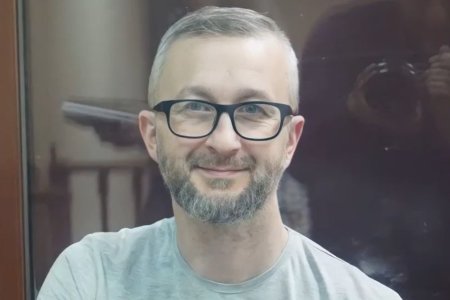
Armed Russian enforcement officers in full military gear burst into the home of Refat Ismailov on 11 July 2024 and violently pinned the 63-year-old Crimean Tatar to the ground. This heavy-handed ‘operation’, videoed and duly publicized by the notorious Crimean SMERSH collaborator Aleksandr Talipov, had nothing to do with any physical danger Izmailov was thought to pose. The 63-year-old was accused solely of comments on the social network Odnoklassniki in support of Ukraine and of the Mejlis, or representative assembly of the Crimean Tatar people, which Russia has been persecuting since soon after its invasion and annexation of Crimea.
In posting the video of Izmailov’s seizure on 11 July, Talipov wrote that “the follower of the banned Mejlis had, in the social network Odnoklassniki rooted for Ukraine, cited terrorists and denied Russia’s territorial integrity”. He had, in other words, shown support for his native Ukraine, which Russia has invaded, and had repeated the position taken by the United Nations and all international bodies, namely that Crimea is part of Ukraine. While unknown what specifically Izmailov is supposed to have written about the Mejlis, the suggestion that he was “citing terrorists” is grotesque. Russia’s systematic persecution of Mejlis leaders, including the brazen arrest and fabricated trial of Nariman Dzhelyal, received international condemnation, as did the 2016 ban on the Mejlis.
Talipov’s ‘Crimean SMERSH’ Telegram channel posts videos on a virtually daily basis boasting of its collaboration with Russia’s enforcement bodies in hunting down Crimeans for their civic position and forcing them to ‘express repentance’. There are fewer details than normal here, with it not even clear which Russian occupation ‘court’ sentenced Izmailov to seven days imprisonment.
The case does, however, stand out, firstly, because of the gratuitous violence against a man who is not young and was not showing any resistance. By the second video, posted on 13 July, Izmailov had almost certainly been beaten and terrorised into ‘apologising’ for his posts. Most of Talipov’s victims are targeted for expressions of support for Ukraine. While this is one of the reasons in Izmailov’s case, it is also of concern that he is accused of supporting the Mejlis.
Russia’s persecution of the Mejlis began as soon as Moscow understood that the Mejlis, and the vast majority of Crimean Tatars whom it represents, were implacably opposed to Russia’s invasion and annexation of Crimea. Within two months, it had banned the world-renowned veteran Crimean Tatar leader and former Soviet political prisoner Mustafa Dzhemilev from his homeland. This was followed, just over two months later, by a similar ban against the Chair of the Mejlis, Refat Chubarov. Then in January 2015, the First Deputy Head of the Mejlis, Akhtem Chiygoz was seized in Crimea and held prisoner until October 2017, when he and another persecuted Crimean Tatar leader Ilmi Umerov were exchanged, probably for two Russian state killers held by the Turkish authorities. Chiygoz and several other Crimean Tatars were charged under Russian law over the huge demonstration on the eve of Russia’s invasion that thwarted Russia’s attempt to carry out an effective coup, without the open deployment of soldiers. The ‘trial’ was thus not only legally nonsensical but was also hugely incriminating, as it highlighted the means, including the Russian thugs, that Russia had used to try to seize control, and the real motives behind Russia’s especially active persecution of Crimean Tatars. By Russia’s arrest of the last remaining Crimean Tatar leader in occupied Crimea, Nariman Dzhelyal, all pretence had been dropped.
The Mejlis had been formally banned in April 2016, in a move described as an act of war against the entire Crimean Tatar people. That shocking ruling was upheld by Russia’s supreme court on 29 September 2016, with the claim being that the governing body of Crimea’s and, indeed, Ukraine’s main indigenous people was ‘an extremist organization’.
Over the following years, Russia ignored not only international protest, but also an express order from the UN’s International Court of Justice to withdraw the ban. It instead conjured up more fabricated political ‘trials’ which it tried to link to the Mejlis.
It was, however with the persecution against Nariman Dzhelyal and two cousins, Asan and Aziz Akhtemov * on grotesque ‘terrorism’ charges that concern began mounting that Russia would try to claim that the Mejlis was ‘ a terrorist organization’. Although there has been no formal ruling to this effect, Talipov’s words about ‘citing terrorists’ must be of concern.
Nariman Dzhelyal was released in an exchange of prisoners on 28 June, together with nine other Ukrainians whom Russia was holding hostage. Asan and Aziz Akhtemov remain imprisoned , as do a huge number of Crimean Tatar and other Ukrainian political prisoners and civilian hostages. While no Mejlis leader is currently imprisoned, this is only because all are now in enforced exile which will only end when Russia is driven from all Ukrainian territory.


